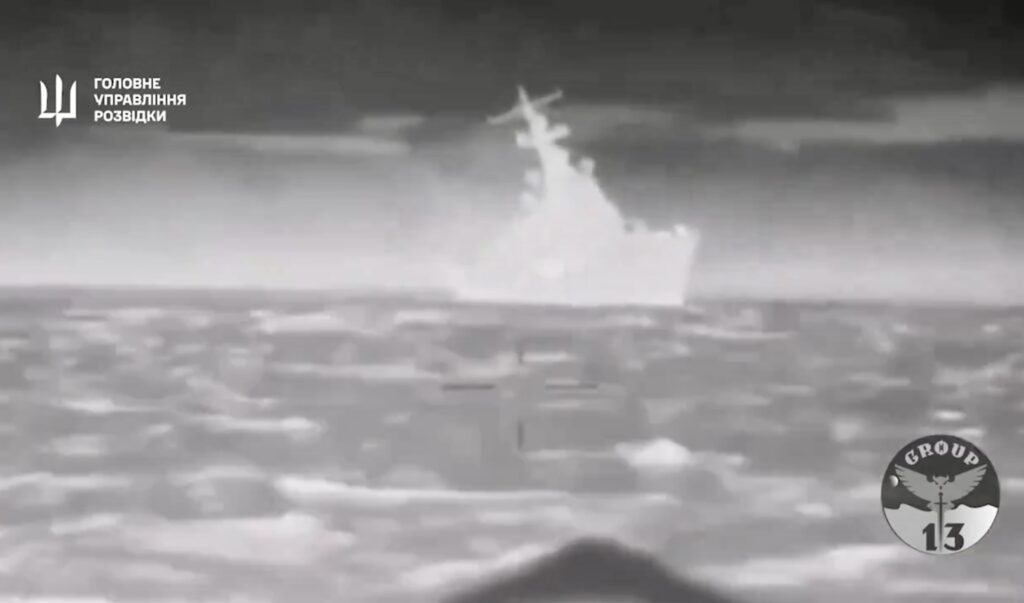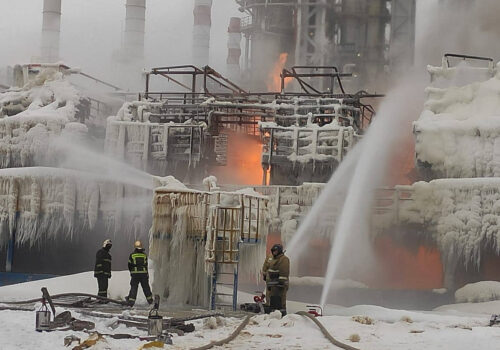As Ukrainians prepare to mark the second anniversary of Russia’s full-scale invasion, the news from the front lines is increasingly bleak. After the failure of last year’s counteroffensive, the Ukrainian military has now switched to active defense and is struggling to prevent fresh Russian advances. This task is being further complicated by delays in Western military aid that are leaving Ukrainian units outgunned and forcing them to ration ammunition.
Amid this mounting gloom, Ukraine’s remarkable success in the Black Sea continues to serve as a welcome source of inspiration. The most recent victory came in the early hours of February 14, when a major Russian warship was reportedly caught off the coast of Crimea and sunk by a mosquito fleet of five Ukrainian maritime drones. The Caesar Kunikov landing ship is the latest in an expanding list of Russian warships to be damaged or destroyed during the past two years. Ukraine has now disabled one-third of the entire Russian Black Sea Fleet since the start of the full-scale invasion, Ukrainian officials told CNN in the aftermath of Wednesday’s attack.
Stay updated
As the world watches the Russian invasion of Ukraine unfold, UkraineAlert delivers the best Atlantic Council expert insight and analysis on Ukraine twice a week directly to your inbox.
The Battle of the Black Sea began on the eve of the full-scale invasion, with Vladimir Putin ordering his navy to impose a blockade on Ukraine’s Black Sea ports more than a week before Russian tanks rolled across the border on February 24, 2022. On paper, at least, the war at sea appeared to be a foregone conclusion, with the Ukrainian Navy’s handful of small vessels hopelessly outmatched by the might of the Russian Black Sea Fleet. However, it would not be long before Ukraine was challenging such assumptions.
Ukraine’s first naval triumph was the April 2022 sinking of Russia’s Black Sea Fleet flagship, the Moskva, which was struck by a brace of Ukrainian Neptune anti-ship missiles. Two months later, Ukraine succeeded in liberating Snake Island, a small by strategically important Black Sea island which had been occupied by Russia on the first day of the invasion. By late summer 2022, Ukraine had begun drone strikes on the Russian fleet and related naval facilities in Russian-occupied Crimea.
These attacks gained significant momentum in 2023, thanks to developments in Ukraine’s marine drone fleet along with the appearance of British and French-supplied cruise missiles in the Ukrainian arsenal. Landmark achievements included a successful long-range marine drone attack on a warship close to the Russian port of Novorossiysk in the eastern Black Sea, and the destruction of a Russian submarine and warship undergoing maintenance in Crimea’s Sevastopol, the traditional home port of Russia’s Black Sea Fleet.
This week’s attack on the Caesar Kunikov is the second successful naval operation in February 2024 alone, and comes following the reported destruction of Russian warship the Ivanovets at the start of the month. As is now customary, news of this latest sinking inspired a flood of memes on social media as Ukrainians toasted the further weakening of the Russian navy. Meanwhile, NATO Secretary General Jens Stoltenberg called it a “great victory for Ukrainians,” and noted that the country has been able to “inflict heavy losses on the Russian Black Sea Fleet.”
Eurasia Center events

The sinking of Russian warships will not prove decisive in a land war, of course. Nevertheless, Ukraine’s success in the Battle of the Black Sea is no mere morale boost and is already shaping the course of the wider war. Ukrainian attacks have made it difficult for the Russian navy to maintain a presence in the northwestern Black Sea and have forced Putin to withdraw the bulk of his fleet from Crimea to the relative safety of Russian ports. This is hampering Russia’s ability to bomb Ukraine using the Black Sea Fleet’s missile-carrying warships, while also disrupting the logistics of the Russian army in Crimea and southern Ukraine.
Crucially, sinking so many Russian warships has enabled Ukraine to break the blockade of the country’s Black Sea ports and resume maritime exports to global markets. The reopening of merchant shipping lanes for the country’s vast agricultural industry represents a financial lifeline for Ukraine, which is struggling to keep its battered economy afloat and fund the war effort. Many were skeptical that Ukraine could defy the Russian blockade, but the results speak for themselves. According to the Ukrainian Ministry of Economy, exports in January 2024 reached 12 million metric tons, the highest monthly total since the start of the invasion and just two million tons below prewar levels.
In addition to restricting the role of the Russian navy and boosting the domestic economy, Ukraine’s victories at sea are also providing important lessons for the future conduct of the war. The effective use of British and French cruise missiles has underlined Ukraine’s ability to deploy sophisticated Western weapons systems, while also highlighting Russia’s vulnerability. The success achieved over the past year in Crimea and the Black Sea with relatively limited supplies of cruise missiles offers a glimpse of what could be possible if Ukraine’s partners finally agree to deliver long-range missiles in anything like the quantities Kyiv is asking for.
Perhaps the single most important lesson to take from the Battle of the Black Sea is the need for the West to overcome its crippling fear of escalation. For the past two years, risk-averse Western leaders have consistently demonstrated excessive caution in their response to the Russian invasion, while warning against anything that might potentially provoke Putin. The Russian dictator has skillfully exploited these concerns, hinting at dire consequences if Western support for Ukraine passes certain thresholds. President Zelenskyy has long complained that this preoccupation with avoiding escalation plays directly into Russia’s hands while leaving Ukraine at a massive disadvantage.
Ukraine’s Black Sea success has now made a mockery of the West’s self-deterrence and exposed the emptiness of Russian threats. During the first year of the invasion, Putin and other senior Russian officials repeatedly indicated that attacks on Crimea represented a red line for the Kremlin. However, when Ukraine ignored these threats and proceeded with its campaign against the Russian navy, Putin’s promised retribution failed to materialize. Confronted with unfavorable new military realities, the Kremlin strongman simply ordered his fleet to retreat.
If Putin is prepared to quietly withdraw the bulk of his navy from Crimea, which is the jewel in the crown of his new Russian Empire, there is every reason to believe he will be similarly pragmatic when faced with the prospect of military disaster in mainland Ukraine. In other words, Putin can be defeated if Ukraine’s partners conquer their fear of escalation and refuse to be intimidated by the Kremlin.
Peter Dickinson is editor of the Atlantic Council’s UkraineAlert service.
Further reading
The views expressed in UkraineAlert are solely those of the authors and do not necessarily reflect the views of the Atlantic Council, its staff, or its supporters.

The Eurasia Center’s mission is to enhance transatlantic cooperation in promoting stability, democratic values and prosperity in Eurasia, from Eastern Europe and Turkey in the West to the Caucasus, Russia and Central Asia in the East.
Follow us on social media
and support our work
Image: Screenshot: GUR of the Ukrainian Ministry of Defense





